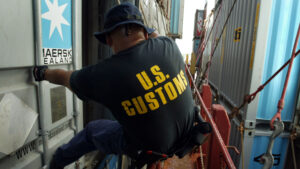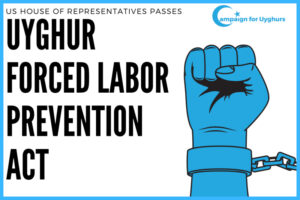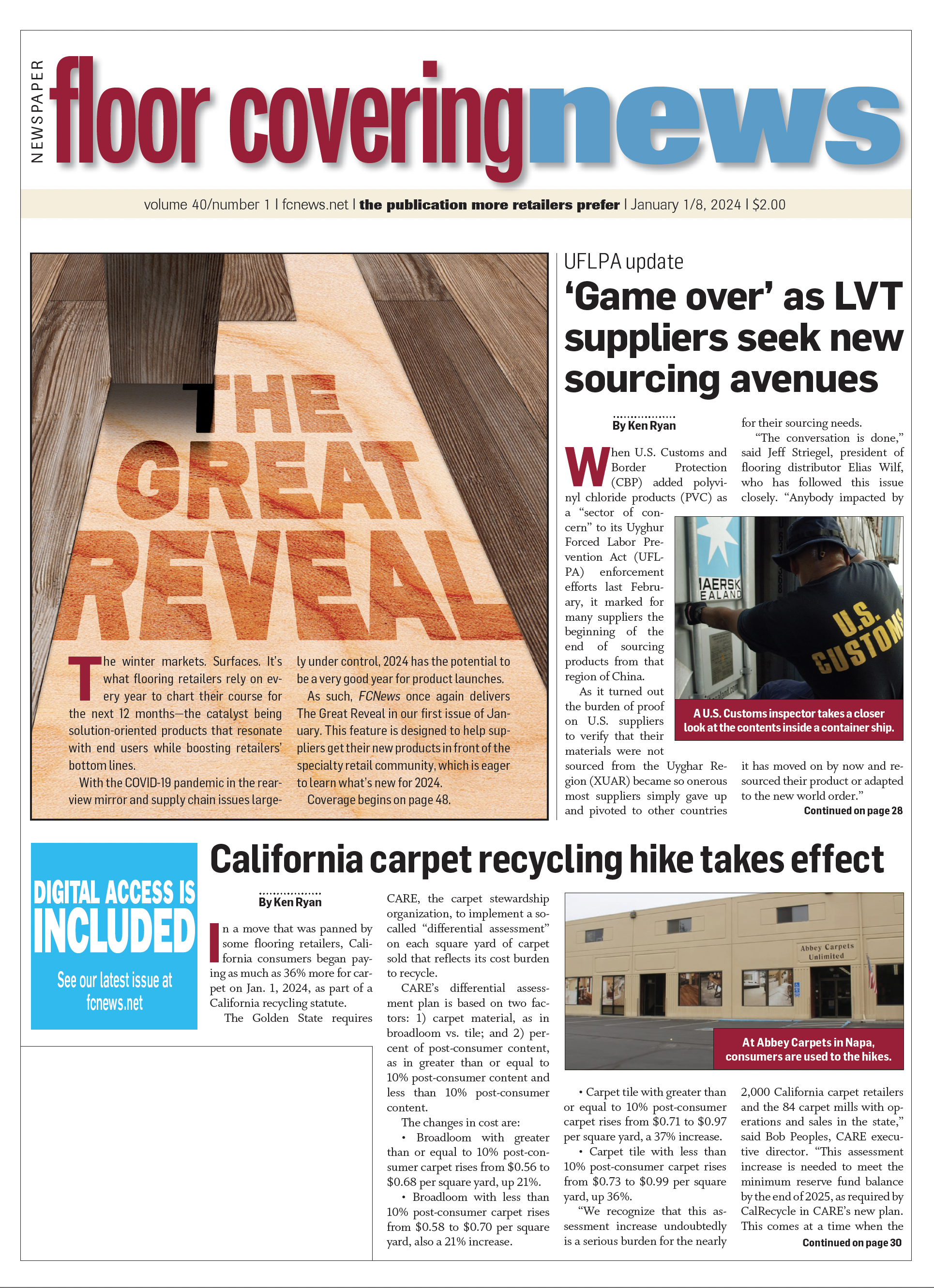 When U.S. Customs and Border Protection (CBP) added polyvinyl chloride products (PVC) as a “sector of concern” to its Uyghur Forced Labor Prevention Act (UFLPA) enforcement efforts last February, it marked for many suppliers the beginning of the end of sourcing products from that region of China.
When U.S. Customs and Border Protection (CBP) added polyvinyl chloride products (PVC) as a “sector of concern” to its Uyghur Forced Labor Prevention Act (UFLPA) enforcement efforts last February, it marked for many suppliers the beginning of the end of sourcing products from that region of China.
As it turned out the burden of proof on U.S. suppliers to verify that their materials were not sourced from the Uyghar Region (XUAR) became so onerous most suppliers simply gave up and pivoted to other countries for their sourcing needs.
“The conversation is done,” said Jeff Striegel, president of flooring distributor Elias Wilf, who has followed this issue closely. “Anybody impacted by it has moved on by now and re-sourced their product or adapted to the new world order.”
Despite their due diligence, suppliers ran into an impenetrable force in U.S. Customs. “Once you get detained, the burden of proof is so high that you’ll never be able to get your goods cleared,” said David Sheehan, senior vice president, residential product, Mannington. “Our conclusion was you will never get [these products] released.”
While waiting for Customs to complete their inspections, manufacturers were forced to store their containers in a bonded warehouse at a rate of $300 a day; that’s roughly $9,000 a month x number of containers—all for a go-ahead that never came. “We got to a point where we looked at the daily expense for storage fees, legal fees and you reach a calculus where even if we get this released, it is untenable,” Sheehan said. “So, we executed return to sender and have redone the supply.”
At least six prominent suppliers were “exposed” in a study titled: “Built on Repression — PVC Building Materials’ Reliance on Labor and Environmental Abuses in the Uyghur Region,” which was commissioned by Sheffield Hallam University. The so-called “Sheffield Report” listed the major companies that sourced product from Xinjiang Zhongtai Group, which was alleged to have shipped the luxury PVC-based flooring to U.S. brands.
The Sheffield report investigated the increased manufacturing of PVC in the Uyghur Region, the manufacturers’ use of state-sponsored labor transfers, the environmental damage this manufacturing was allegedly causing and the routes by which the resulting PVC-based products traveled through international markets.
“PVC flooring resins made in China are present in more than one-quarter of all flooring sold in the U.S.,” the Sheffield report concluded. “The XUAR produces the lion’s share of PVC resins used in that flooring. PVC made by Xinjiang Zhongtai Group is shipped directly to Vietnamese flooring manufacturer Jufeng New Materials, which then ships luxury PVC-based flooring to the top U.S. flooring brands.”
In September 2023, the U.S. Department of Homeland Security (DHS) added Xinjiang Zhongtai Group to the UFLPA “Entity List” of companies blacklisted for their alleged involvement in forced labor.
With that it was game, set and match for U.S. companies with ties to Xinjiang Zhongtai Group. “The U.S. government actually used that Sheffield report to determine who the [suppliers] were,” Striegel said. “The problem was it was anything but a complete list. It only identified the larger, middle-to-upper producers and left all the small-to-medium guys out of the equation. If you were on that Sheffield report, you got screwed. If not, you got a free pass. It was a half-baked approach.”
It did not help the cause that Customs agents operated as strictly an enforcement arm rather than as an agency that could help U.S. companies traverse through the gauntlet of regulations. “All we were asking was: ‘Help us navigate what you are looking for and be reasonable,’” Mannington’s Sheehan said.
 Blessing in disguise?
Blessing in disguise?
If there was anything positive to emerge from UFLPA for flooring manufacturers, it’s that the experience taught them the importance of a diversified supply chain. As Sheehan observed, “You can’t have all or most of your eggs in a single basket. Thank God we have manufacturing capability in the U.S. We have gone ahead and onshored more stuff as a provisional risk mitigator. ‘Spread your supply chain out’ is the takeaway from this. It’s been a long ordeal, but we can see there is light at the end of the tunnel.”
In addition to the U.S., Mannington sources from Vietnam, Thailand and India.
It is estimated that 12% to 15% of LVT (and related products) are made here in the U.S. today. Within five years, executives said, that number could be 20% as more companies add capacity domestically.
Incidences like UFLPA will only encourage suppliers to step up their onshoring efforts, according to Striegel. “Everyone is looking for exits out of China or for alternatives,” he explained. “Vietnam is in play, and there is an evolution out of India and certainly Mexico that is happening today. Out of our own backyard U.S. plants are exploding, and it’s wonderful. While it is painful what happened with UFLPA, it is forcing us to do something that will be a positive down the road.”
And yet, Striegel said he is still seeing what he called “a proliferation and oversaturation of [resilient vinyl], which is unlike anything I have seen in my 46 years in business. It has reached a point of insanity. There have been new LVT suppliers and brokers in my region [in Maryland] every two weeks for the last five months. I don’t know how that changes when this remains the fastest-growing floor covering category.”

